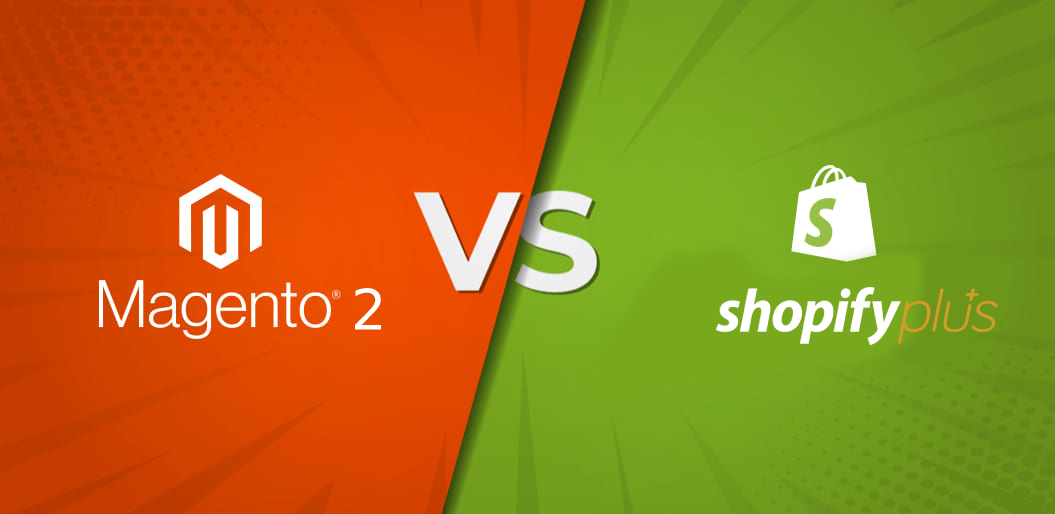When looking to build a new E-commerce store, Shopify and Magento are the two renowned platforms that are major shortlists. They are mostly preferred by businesses launching brand new sites and to those migrating from one platform to another. ‘Shopify Plus’ and ‘Magento 2’ is the advanced versions of each platform used by brands to become E-commerce businesses.
This blog post covers a detailed overview of each platform, compares Shopify Plus vs Magento 2 and lists down a series of the most common scenarios experienced by businesses when selecting one for the E-commerce store development. The blog is broken into the following sections for better understanding:
Introduction to Shopify Plus and Magento 2
Deciding the right E-commerce platform can make or break it and yet there are several options available with little clear-cut, objective guidance. This blog is all about sharing important information on choosing between two of the most popular platforms: Magento 2 and Shopify Plus.
- Magento 2 is the ‘Enterprise’ version, a popular platform that was acquired by Adobe in 2018.
- Shopify Plus is the ‘Pro’ version, that initially started to serve very small retailers, and later grew upward.
We have picked the most important points of difference to make a wise decision while selecting CMS for E-commerce development.
Hosting
Shopify Plus
Shopify Plus is a software as a service (SaaS), which runs on a different server as well as comes fully hosted. It is a popular alternative to self-hosted software and companies are moving from traditional hosting to web-based models.
The best part of SaaS is the availability of the site’s security. Shopify development services take care of everything from SSL certificates to PCI compliance. These automatic updates help in saving resources on manual site updates.
Magento 2
Magento is a self-hosted platform, which means a third party host is required for the E-commerce store. Hosting Magento 2 website needs a robust server, which results in deep customization. It also means any downtime or technical issues your site experiences is completely on your part. That’s why most companies hire Magento developer to host their website and maintain its security. All updates and security patches are integrated by the developer, which adds to your monthly cost.
Ease of Use
Shopify Plus
Shopify is one of the simplest E-commerce platforms for regular usage. Designed with store merchants in mind, the backend features comprise of simple drag and drop functionality. Customizing the homepage, editing the navigation can all be done with a few clicks. Although Shopify Plus and Magento 2 have numerous common features, Shopify eases them for day-to-day use. Small changes can be done without developer assistance, this help to save agency resources.
With the availability of built-in tutorials, Shopify Plus makes the backend simple to use. It implements ‘what you see is what you get’, thus no need to access the HTML or CSS when changes need to be done.
Magento 2
Magento is a complex and difficult CMS to set up, but it’s also difficult to use on a daily basis. It requires deep learning and unless you’re a backend developer, you’ll find tough to go with it and make changes.
Although Magento has several unique features in its kitty, you’ll require advanced knowledge to be able to implement them. With no drag and drop functionality, customizing the homepage or navigation is a complex job. If you’re not tech-savvy, the best option is to consult a Magento development company for expert guidance and smooth development work.
Multi-Stores
Magento 2
With the global E-commerce industry growing at a rapid pace, how you will target a global audience is one of the major things when choosing a platform. Do you want a separate store for every country? Or would you sell worldwide from your main site? Your plan is the deciding parameter between Magento 2 and Shopify Plus.
One of Magento’s advantage is the presence of multiple stores from a single interface, allowing you to have different websites for different countries. With the availability of local domains, languages, and currencies, customers can enjoy shopping in a better manner.
This multi-store functionality means product catalogs can be shared across different stores, with the feature to apply changes across all websites. For this reason, Magento 2 is a popular choice for international brands.
Shopify Plus
Shopify Plus allows the creation of 10 different store views at a time, but unlike Magento, they need to be on separate interfaces which become highly complicated. You can share the data between the stores using content syncing, but it needs a lot more work than the Magento. So, if you’ve decided on having different stores, Magento 2 development is the best service to avail.
Shopify Plus provides a feature to sell in multiple currencies, but these prices will ultimately revert to your main currency at the checkout. This approach isn’t a great customer experience and needs proper changes for better results.
Customer Support
Shopify Plus
Shopify Plus offers 24/7 support through phone, email and live chat. Each user is provided by a Merchant manager for personalized support. In addition, Shopify handles updates and security for the user, you’re less likely need access support in the first place.
Magento 2
All customers get forums and guides as well as 24/7 support in the case of any trouble. Customers also get support from Magento’s account management team, but at an additional price. For self-hosted Magento customers, most of your support related queries will get resolved through your hosting provider, which can make things complicated. Unlike the Shopify Plus, which requires flat charges, the speed at which Magento offers support depends on the price of your plan.
Frequently Asked Questions
Which is better Shopify or Magento?
Hosting pattern is the major difference between the two CMSs. Shopify is a hosted platform while Magento is a self-hosted. Shopify takes care of all the hosting troubles. All hosting costs are included within the monthly plan with no additional effort or expense needed from the user.
Why Magento is best for E-commerce?
Magento is a flexible and secure platform for E-commerce development. It is one of the best platforms in terms of features, security and support. You can build a fully scalable and advance an E-commerce store by using Magento CMS.
Is Shopify a good place to sell?
Overall, Shopify is the best hosting solution for those planning to build an online selling platform and one of the best for those who want to use one product to sell. It’s also great for the users who are interested in dropshipping.
What are the advantages of Shopify plus?
Overview of Shopify Plus Benefits
- SaaS platform
- Bandwidth
- Payments
- Security
- Customization
- Reports
- Multichannel Sales
- Custom Fulfillment
Wrapping Up:
Both platforms have their advantages & disadvantages. Therefore, the decision to choose between Shopify Plus and Magento 2, completely depends on your business requirements. Major factors for selection are cost, security, hosting, business strategy, and available resources. For small to mid-size businesses, both CMSs are good. From above it is a bit difficult to say the clear winner of Magento 2 vs Shopify Plus. If you limited products to sell in limited space, then Shopify Plus is a perfect choice. But, if you have a huge list of products to sell on the global front, then Magento 2 is a perfect choice.























